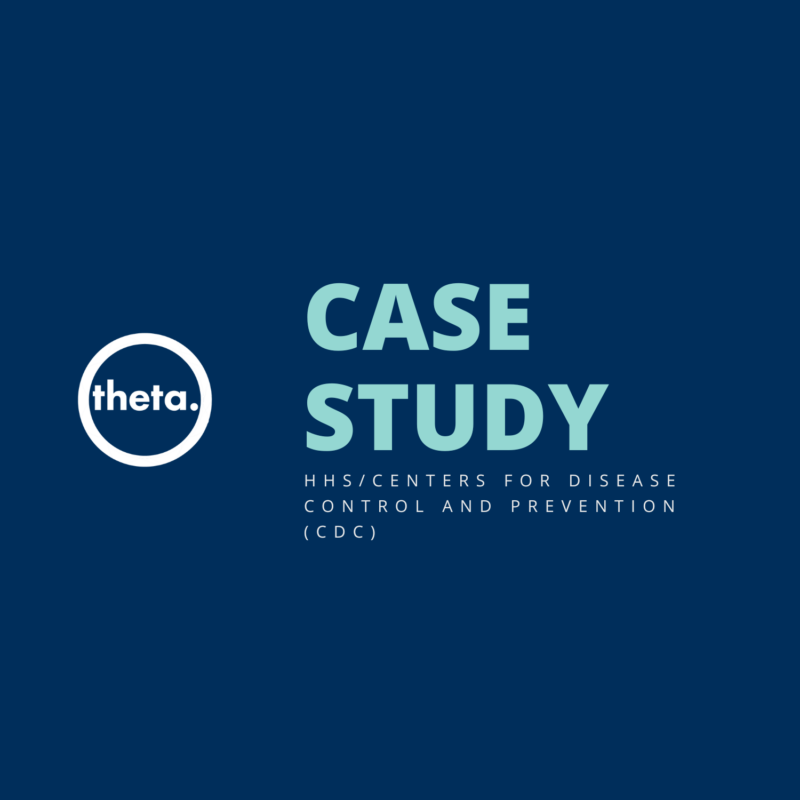
Amid the disruptive turbulence of the COVID-19 pandemic, the U.S. Department of Health and Human Services (HHS) and the Centers for Disease Control and Prevention (CDC) identified an urgent need for more flexible and sustainable public health infrastructure.
theta. – an SBA-Certified HUBZone digital integration & management firm based in Baltimore, MD, working to create a world where tech works for everybody as a subcontractor has been providing software development services, helping shape one of the fundamental pillars of this initiative: ReportStream. This real-time, cloud-based platform, integrated within the Pandemic-Ready Interoperability Modernization Effort (PRIME), receives, processes, and shares data across and between jurisdictions, optimizing the flow of critical health data.
The COVID-19 pandemic exposed the frailties of traditional public health data management systems, overwhelmed by a torrent of information from myriad sources, including hospitals, laboratories, non-traditional COVID testing sites such as schools and nursing homes, and more. The challenge was not only to streamline the collection, processing, and distribution of this crucial data but also to create a resilient and adaptable system to cater to the evolving landscape of health threats, capable of managing massive data volumes and adhering to stringent privacy and security protocols.
To meet this challenge, theta. has brought our extensive software development expertise to the forefront. Central to our support has been implementing open data standards and specifications established by the global FHIR (Fast Healthcare Interoperability Resources) community. We have sought to leverage these standards to develop FHIR-based services tailored to the public health sector’s needs, capable of receiving data from various providers.
Working closely with other stakeholders, our team has focused on developing FHIR services that enable:
As part of our support, we have helped deploy a suite of software development tools, including Azure, Java, Kotlin, Zenhub, GitHub, Docker, and Azure Monitor, to achieve these ambitious objectives. With these resources, we create and integrate services to ensure connection security, enable audits, visualize data being exchanged, and automatically compute performance metrics.
Azure provides the cloud infrastructure to handle and process massive volumes of data efficiently and reliably. Java and Kotlin power the back-end processing, enabling seamless data flow across the system. The team utilizes Zenhub for project management, helping us track and meet our targets within the defined timelines. GitHub is our version control system, fostering collaboration and maintaining a robust codebase. Docker facilitates our deployment process, ensuring consistency across all development and production environments. Finally, Azure Monitor monitors our application, helping identify and resolve any potential issues promptly.
Our work with ReportStream is ongoing and continuously evolving to meet the changing landscape of global health crises. The platform is already playing a crucial role in the fight against COVID-19 and other health-related outbreaks, offering a more efficient, robust, and scalable public health data management system. As we continue to adapt and enhance the platform, we remain committed to supporting the critical mission of CDC and its partners, ready to respond swiftly to the demands of the ongoing pandemic and future public health emergencies.
As a software development & digital integration partner, our ongoing contribution to the ReportStream project underscores the transformative power of strategic software development in bolstering public health systems. Our work will continue to provide the critical infrastructure necessary to meet the present health crisis and serve as a blueprint for future public health emergencies. By merging technological prowess with forward-thinking strategies, we are helping to shape a more resilient, efficient, and adaptable public health data management ecosystem, fortifying our readiness for the challenges of tomorrow.